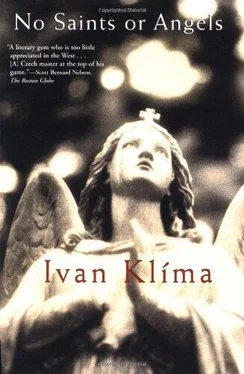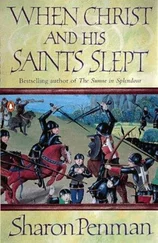He might resemble me. If he did, I could immediately give him a hug. Hello brother! This is me, Kristýna, your half-sister.
But it would most likely give him a fright to have some strange woman suddenly putting her arms round him and hugging him.
I don't even have to go in. I can just take a look where he lives. That's if he still lives there.
I turn into the street whose name betrays the proximity of the river. However by now the river is well and truly concealed by factory buildings, ugly warehouses and a maze of walls and garages. I walk along the opposite pavement past dingy apartment houses with lots of little shops tucked in between them. Gypsy children play at the side of the four-lane carriageway.
The house I seek has just two floors. Patches of stone walling show through where the rendering has come away. A TV bellows from an open window. The battered front door is open. I hesitate a moment, but seeing I've come this far I'm hardly going to wait outside.
The passage stinks of mould and sauerkraut. I can't see any list of tenants but there are letterboxes fixed to the wall in the corner behind the door. On one of them I find the name I've attributed to my unknown brother. It is written in large block capitals. The letters lean to the left and their feet are decoratively rounded. They strike me as familiar. I search my memory in disbelief, or rather I hesitate to believe what I've now realized. I wasn't the only one to set out in search of my lost half-sibling. He had come to find me and chosen to leave me threatening letters that he forgot to sign.
So I've found the one I was looking for, the one who didn't invite me. I could turn round and leave but instead I continue along the passage and look for a door with his name.
It's right on the ground floor. I recognize the lettering before I even read the name. I ring the bell and wait.
For a long time there is no answer. And then suddenly the door opens although I have heard no approaching footsteps. Aghast, I stand facing my father in a wheelchair, my father as I remember him from my childhood. Bushy blond eyebrows, hair already going grey, cold, blue eyes and a large prominent chin. He eyes me, a strange woman, with mistrust.
I introduce myself and say, 'I've found you at long last.'
'How do you mean?'
'I always wished for a brother,' I say. 'But I didn't know about you. And now I found a mention of you in the notebooks that Dad left behind. You know he died, don't you?'
'You'd better come in — Kristýna.' He backs away in the wheelchair and instead of turning tail I enter the flat. The living-room door is wide open, I expect it's the only room in the flat. The furniture is of dark wood that predates chipboard. A TV set stands on a low table and a two-ring electric cooker stands on another table in the corner. The walls are hung with paintings in garish colours full of strangely twisted shapes, the distorted bodies of people and animals, as well as tree stumps. They all
carry inscriptions written in the same backward-leaning script. Various birds sit motionless in two cages hung from hooks fastened in the ceiling. He follows my gaze: 'They're stuffed. Kristýna, Kristýna,' he then says, 'Mum told me about you.' He wheels himself over to the table, picks up some sheets of paper and crumples them into a ball before tossing them into the waste basket. Perhaps they were letters ready for me. 'I'll make some tea,' he suggests.
I offer to put the kettle on.
'No, no, I'm used to doing everything for myself. But you could fetch some water. The tap's in the passage.
He hands me a kettle and I go out into the passage for the water. I don't know what I'm still doing here or what I can talk to him about.
'What did Dad die of?' he wants to know on my return.
'He had a tumour.'
'And you're a doctor!'
'Only half a one,' I say, as I usually do when my profession is mentioned.
'I know, Mum told me. I never saw my father,' he adds. 'So don't be offended that I'm not sad about his death. I expect you spent more time with him.'
That's for sure. But it wasn't quite the way he probably imagines. Even so I suddenly feel a sense of guilt towards him.
'I wanted to be a doctor too,' he says, 'but this happened to me.' He indicates the wheelchair. 'So I gave up the idea.'
'How did it happen?'
'I dived into the river and hit a rock.'
'I'm sorry.'
'I've started painting.' He points at the pictures. 'They're all my work.'
'I recognized they were by you. They're. . they're interesting.'
'I used to design toys for a craft workshop, and textiles too, but I can't get any work these days. It's a shitty awful world. They'd
sooner send cripples to the gas chamber! They'd save money and could give the able-bodied a tax cut.'
The kettle whistles. He wheels himself over to it, tips some tea into a strainer and pours the water over it. The mugs he fetches are large and don't look too clean, but why should he have clean mugs here?
'Sugar or rum?'
'I don't take sugar.'
He heads for the dresser and brings out a bottle of rum. He pours some into my tea and then into his own. He treats himself to more rum than tea.
'I'm sorry it happened to you,' I say. 'Do you have anyone to look after you?'
'I look after myself I detect in his voice Dad's grim determination. 'Mum used to take care of me before she died. That's a picture of her over there.' He points towards the table, on which a small photograph stands in a frame.
I get up and go over to look at it. The woman in the photo could be about my age, maybe a little younger; the portrait is obviously old, some time from the end of the sixties, to judge by the hairstyle. I stare at the face but find nothing interesting in it. I don't know what I'd say about the woman that Dad secretly loved.
'My girlfriend used to visit me too,' my half-brother tells me. 'But she got married and now she has children. I've got other friends,' he quickly adds, 'they just look in on me and do me the odd favour, but they don't have time to look after me. Dad never came, not even after my accident. He ruined Mum's life and mine. I dived in that water just to show I was somebody, even if I didn't have a dad. Sometimes a single stupid act can decide your whole future.' He has drunk his tea and now pours just rum in his mug.
He depresses me. I sip my tea and think about the fact that this man is my brother. I ought to feel something towards him, but I doubt that I can.
'I imagined you differently,' he suddenly says.
'How did you imagine me?'
'Uglier, I should think,' he says with unexpected bluntness. 'So you have a daughter?'
'Yes.' But I won't tell him anything about her. I don't intend to let him in on my suffering, or my joys, for that matter.
'Bring her to see me some time.'
I remain silent.
'That's if you ever fancy visiting your crippled brother.'
'That's not important — the wheelchair,' I say. 'I'll come any time you want, or if you need anything.'
He doesn't say yes, but he doesn't refuse either. 'How's your work? Plenty of patients?' he asks.
I tell him I have as many as I can cope with.
'And you're earning!'
I tell him it's no great shakes, but enough for us to live on.
'I needed a bridge,' he says, opening his mouth slightly and pointing at it, as if intending to display someone else's dental work, 'and my dentist wanted fifteen thousand to do the job. For a few minutes' work! And I had to save two years to pay for it.'
I tell him I never charge as much as that. If he came to me I'd do him his bridge for free. What I don't tell him is that it would certainly do him a lot more good than writing me threatening letters.
'I didn't know how you'd take me,' he says. 'I wasn't part of your family, was I?'
Читать дальше












